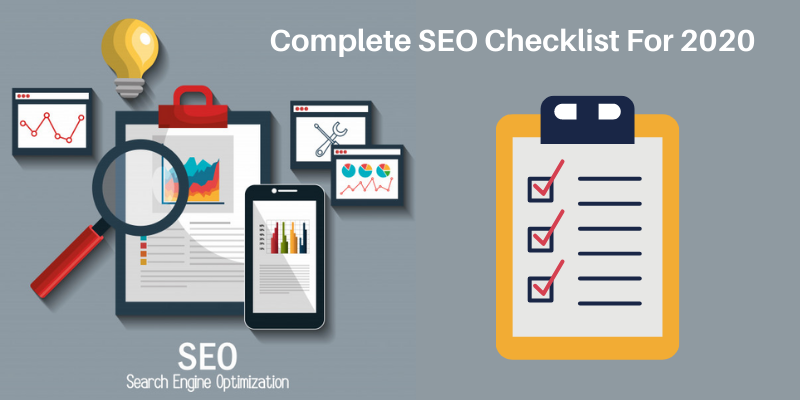Complete SEO Checklist For 2020

Google Search Console – A Beginners Guide
May 13, 2014
Top trends of Social Media in 2020
May 21, 2020Introduction to SEO
The world of SEO is changing and it is vital to be aligned with the latest updates to stay competitive. As an organization, you need to increase the website traffic and its quality by organic search engine results.
The world of search engine optimization is complex and ever-changing, but you can easily understand the basics, and even a small amount of SEO knowledge can make a big difference.
Free SEO education is also widely available on the web, including in guides like this!


Introduction to SEOGoogle Algorithm behind SEO
Google’s algorithms are a complex system used to retrieve data from its search index and instantly deliver the best possible results for a query. Google algorithm decides the website’s SERP positioning in the search results, however, the algorithm of Google is not fixed and is continuously evolving.
Now there are much fewer ways around Google’s principle “quality first” than in the past. No doubt you’ve heard about the silent judges who made it possible: Panda, Penguin and Pigeon, to name but a few.
SEO Checklist for 2020
Let’s take a look at the detailed SEO checklist that you should follow in 2020 to rank high in the search engine results
Here’s a list of ON Page Checklist -Have a unique domain name - Having distinctive and undefined domain names for the website helps in building a brand name. Either of www or non-www domain version choice helps you be consistent with search engines.
XML Sitemap submissions help in Indexing - Having a sitemap and submitting the URL to Google Search Console helps in search engine indexing and also notifies Google about any changes that you make to your website.
Create HTML Sitemap - Unlike XML, HTML helps in navigating on your site easier, thereby helping you to improve the user experience, and improving your search engine optimization.
Use Optimized Robots.txt - Create a Robots.txt file in the root, to prevent search engine robots from crawling and indexing specific areas of your website. Make Your Website Responsive - Google loves responsive websites, principally because responsive websites are compatible with all platforms like desktops, mobiles & tablets.
Use Heading Tags (H Tags) and generate more traffic - Heading Tags or ‘h tags’ help search engine robots to establish the relevancy of your content by providing a basic description of the content, thereby maximizing your content's visibility on search engines.
Optimize Images using Alt tags - Search engine robots can't see images, therefore they can't index them. By adding an Alt tag, you aid the search engine robots to read the text which is linked with those images, thereby expediting faster & accurate indexing, which in turn enhances the accessibility of your site on search engines.
Check for Broken Links - Broken links blocks the search engine robots from indexing your web pages. Hence, you must fix this issue immediately, to avoid harming your website's rankings.
Use Quality Page Meta Title & Descriptions - An intelligently composed page meta title (Max 60 Chars) and description (Max 140 Chars) improves the quality and quantity of your search traffic and assists search engines & users, to know what your page content is about.
Check for Duplicate Content - Having unique content on your website is a plus. It helps the search engines to reach you easily. Duplicate content makes search engines’ job of indexing web pages, relevancy check, weblink metrics, tough. Thus, you must check for duplicate content and remove it to avoid losing search engine visibility.
Implement LSI Keywords to boost SEO Traffic - LSI (Latent Semantic Indexing) keywords are the ones related to the keywords that are searched on Google. Implementing LSI keywords helps you to optimize your article's keyword density and it helps Google to judge the relevancy of an article, thereby increasing your site's chances of ranking higher in the search engine results.
Keywords in Header Tags, Description & Title - For best SEO results and improved ranking, you must place your page’s best keywords in H tags, description & title, to let search engines know what the page is all about. However, make sure you do not spam or over-optimize these areas by stuffing keywords in them.
Use Hyphens To Differentiate Words In URL - The structure of URL matters. Thus, you must have your site's URL as simple as possible and use hyphens to optimize your URLs.
Use Social Sharing Buttons - Effective use of social sharing buttons is vital for on-page optimization. It gives the visitors, the flexibleness to share your site's content with just one click, which in turn pushes in more traffic to your site.
Create Long & Statistics Based Content - Long content enriched with actual analytical data converts better than short content. Moreover, it also helps to get more outbound links and they do well on, thereby growing your search traffic.
Proofread The Content Before You Go Live - Proofread to reduce typos, spelling mistakes and review the grammar of the content, to ensure the best quality content for viewers, and to enhance search engine visibility.
Make Use of Local Citations - The citation is an online directory to your business's name, address & phone number on other web pages. Using local citation aids you to grow your local ranking and creates higher brand awareness.
Use Rel Canonical Tag To Improve Ranking - Rel canonical tag assists you to eliminate duplicate URLs, thus facilitating faster and effective indexing, which results in increased Page Ranking.
Optimize Website Speed - To retain your viewers, get higher traffic and improve your site's search engine ranking, you must optimize your website's speed. Optimize Your Contact Us Page - Customize your Contact Form. Make it as engaging & user-friendly as possible to expand your customer base.
Use SSL Certificate To Boost Ranking - Google rewards sites that apply an SSL certificate by raising their rank on the search engine. Use 301 Redirects - 301 Redirect helps you to maintain the SEO value of a web page, by shifting page rank, domain authority, etc., to a new page, thereby conserving your ranking in SERPs.
No-index or Remove Thin Pages - Thin or low-quality pages add little or no value to your site. By implementing a no-index tag on these pages, you determine search engine robots not to index them. In other words, to sustain a standard for your website, it is best to get rid of low quality, thin content.
Add Modifiers to Title - More often than not, users tend to add modifiers such as '2020', 'best', 'review', 'top', 'guide', when exploring online. Thus, by adding modifiers to your title, you are assuring that your site displays in SERPs for these searches. Additionally, it enhances the user's experience.
W3C Validator - A W3C validated mark-up code makes your site more search-engine friendly. This mark-up verifies that you are using clean HTML codes on your site, and assists in improving ranking as well as aids in smoother indexing.
Here’s a list of OFF Page Checklist -
For page rankings, the activities that you carry out outside your website also matters. Here’s a list of few key factors
Set-up Search Console (Webmaster Tools) Account - Google Search Console provides you insights into which keywords are popular on your site, what web pages have been indexed, and a list of external & internal links, and more.
Submit to Google Local Listing - Submit your website's local listing on Google My Business, to boost your local SEO and increase your website's visibility.
Create Social Brand Pages to Boost Ranking - Get more organic search traffic and rank well in SERPs, by building a profile for your business on social channels such as Facebook, Twitter, Instagram & LinkedIn.
Use Google's Disavow Tool to Improve Ranking -Google's Disavow Tool aids you to eliminate spammy & unnatural links from your site, thereby enhancing your site's ranking on the search engine.
Use Google Business Reviews - Google loves displaying reviews in search results. Also, positive reviews of your brand boost user trust, resulting in higher CTRs & conversions.
Check & Review Google Analytics Account - Regular reviewing of your Google Analytics Account will provide you an insight into which SEO methods are working and which are not. In other words, it extends an in-depth analytical insight into your website's traffic and performance.
Exclude Internal Traffic From Google Analytics - To get precise data on your website's performance, you must exclude Internal IP addresses from Google Analytics.
Create Infographics To Generate Backlinks - Infographics are one of the most widespread methods to increase your site's traffic with quality content, and to gain high-quality authority links.
Enhance Your Outreach Strategy - A good Outreach strategy is one of the most productive ways of enhancing your SEO. Not only does it help you to get better & appropriate links from quality sites, but it also helps you to generate strong connections with influential bloggers.
Effective Use of Guest Blogging - Guest blogging benefits you to boost your site's organic search ranking, by increasing your site's visibility on search engines.
Be Active On Quora To Improve Ranking - Respond to inquiries on Quora and if there is a specific article on your site that assists in strengthening your answer, link them.
Look for Broken Link Opportunities - Search for broken links on relevant websites and point out any live ones to the website owner. Then, ask them if they want to replace it with a link to your similar article, so you can get a quality backlink.
Competitor link profile analysis - Review relevant link metrics of your website and that of competitors with the help of Moz Open site Explorer. It gives you important data, such as page authority, domain authority, backlinks, anchor text, etc. by which you can guess your competitor's link building strategy.


